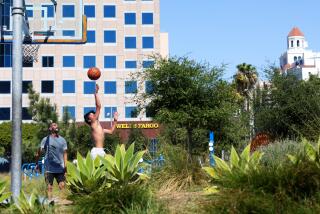TURMOIL IN CHINA: The Struggle for Power : Paper to Tell Chinese ‘What Really Happened’ : Journalists Try to Send the News Home
- Share via
Concerned that the Chinese people are not getting the truth, about a dozen former Chinese journalists now living in the Los Angeles area have begun publishing a newspaper that they hope to send back to their homeland.
Working from an apartment in Alhambra, they plan to print about 6,000 copies of the Press Freedom Herald this morning and mail copies to friends and relatives in China, asking others to carry it in by hand.
The journalists, some of whom have worked for Chinese newspapers that were banned or censored by the government, are living in the United States as students. Many had planned to return, but changed their minds after the recent turmoil.
Colleagues Demonstrated
“All my colleagues marched in Beijing,” said Bi Qi, a San Gabriel resident and former reporter for the Beijing Evening News. “They don’t have freedom of the press there. Here we have freedom of the press.”
Although news of the political turmoil in Beijing has dominated news reports worldwide for nearly two months, official reports in China have been inaccurate and sketchy, especially for those living outside metropolitan areas, said Cao Changqing, editor of the Herald.
Bi said a friend who arrived in Los Angeles last Saturday from Shandong, a province about 200 miles southeast of Beijing, said the government has described the protesters as “troublemakers.” The friend’s only non-government source of information was the Voice of America, but Chinese authorities have been jamming the broadcasts, Bi said.
Despite media reports that hundreds, perhaps thousands, were killed in the military crackdown at Tian An Men Square, the official Chinese news reports have insisted that the death toll is only 300, and only 23 of them students.
“This is clearly a lie,” Cao said. “We want to let the Chinese people know what really happened at the Tian An Men Square massacre.”
The paper’s volunteers worked past 3 a.m. Wednesday night in the Alhambra apartment, writing and editing articles for the first issue. The editors crammed news summaries from Chinese- and English-language newspapers onto one single broadsheet-sized sheet to facilitate mailing and transport.
The paper included a list of the confirmed dead--complete with names and ages--and photographs of some of the victims’ bodies.
“If you don’t have pictures, people may not believe it,” said Paul Chen, a former reporter for China’s World Economic Journal. Herald staff members also were careful about adopting terms used by the various Chinese-language newspapers that they quoted.
A Taiwan-based newspaper, for example, referred to the Chinese army as the “Communist Army,” which Herald editors changed to the “People’s Liberation Army.” Otherwise, they said, readers in China would dismiss the Herald as Taiwanese propaganda.
Supported by Area Chinese
Support for the Herald has come from Los Angeles area’s Chinese community, said Cao, the editor. In one day the association raised $3,000. One supporter donated and hand-delivered a fax machine, which Herald staff members have been using to distribute news releases and gather information from other sources.
The Los Angeles offices of Chinese-language newspapers based in Taiwan and Hong Kong have also been generous with their help, Cao said. Sing Tao Daily, a Hong Kong-based newspaper, has offered the Herald free use of its presses and is charging only typesetting costs.
Work on a second issue of the Herald has already started, and the staff plans to publish as often as finances will permit, Cao said.
More to Read
Sign up for Essential California
The most important California stories and recommendations in your inbox every morning.
You may occasionally receive promotional content from the Los Angeles Times.













